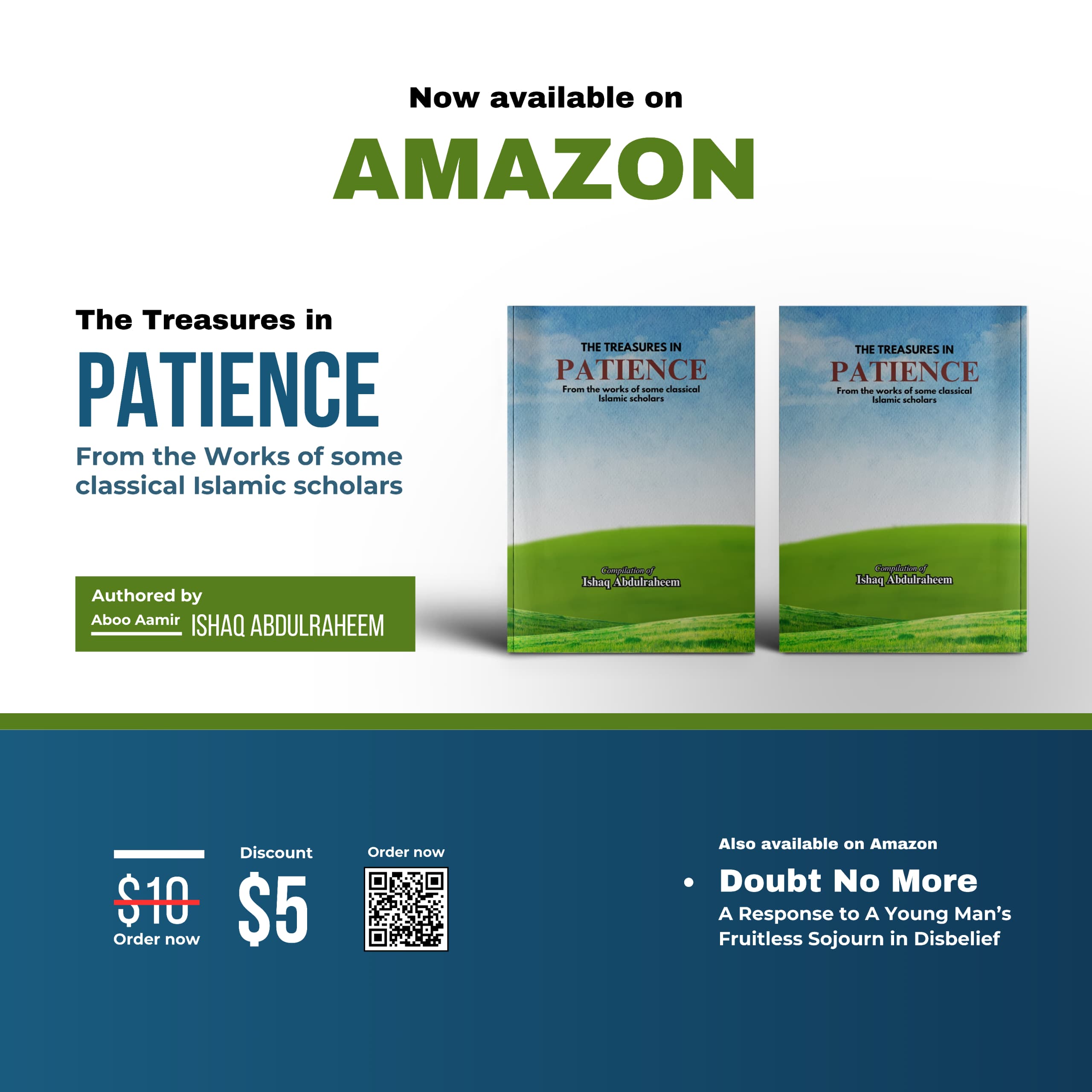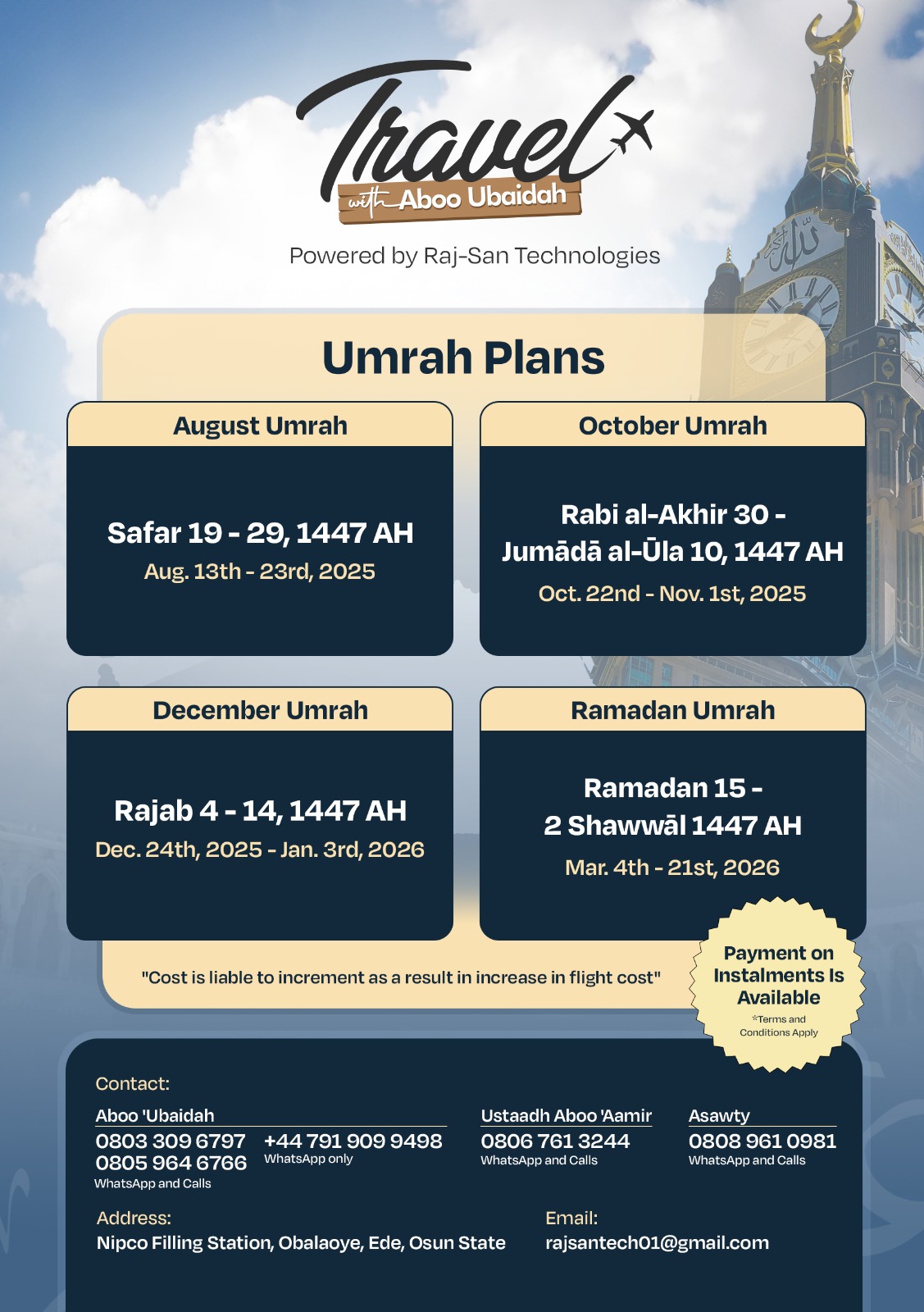Bismillahir Rahmanir Raheem
سلسلة علّمني ديني
By: Shaykh Muhammad bin Umar BÄzmÅ«l –hafidhahullah–
Translations and Annotations by Misbaah Olagunju (Abu Aamaal)
[4] My Religion Taught Me:
That people's age is not factored by days, months and years, rather it is factored by good deeds (done), similarly wealth is not reckoned by what a Muslim leaves behind of it after his death, indeed what will be retained (what will benefit him from it) is whatever he spends of it in obedience to Allah and in seeking nearness to Him the One free of all blemishes.
Translator's notes:
As usual the Shaykh summarizes numerous benefits in this two statements, the first part being about the essence of age: it is widely known that people pride in the numbers of years they have been alive and demand by it respect but only few of them are truly concerned about how they've spent those years, and these days, months and years which has passed over them is of no benefits to them if they are spent in other than accruing rewards, because that will be the only thing that matters in the hereafter. The fruitful life is one whose days, months and years are expended upon the obedience of Allah and performing good deeds.
Therefore what matters is the amount of good deeds one is able to do in that period of existence and not the length of life, so a man may have lived for 80years, and another who has lived for only 40 years may have more barakah (blessings) in his age than the one who has been alive for 80years, this is because the later lived his life mostly upon doing good deeds while the earlier has been heedless with his time.
And this is an admonition on time management, so whoever Allah blesses with time and health, let him be avaricious upon the obedience of Allah and pilling up good deeds.
Al-Hasan Al-Basri said:
ابن آدم، إنما أنت أوقات، Ùإذا انقضى يومٌ، ذهب بعضك"
"Son of Aadam, verily you are time, so whenever a day passes, a part of you is gone"
The second part of his statement –hafidhahullah– addressed beneficial wealth; man is for the most part of his life gathering wealth and riches because of his excessive love for it.
Concerning his love for riches Allah –the exalted– said:
وَتÙØÙبّÙونَ ٱلۡمَالَ ØÙبࣰّا جَمࣰّا
"And you love wealth with much love!" – [Surah Al-Fajr 20]
Some aspects of this wealth he enjoys in this worldly life; this includes whatever of it he spends on what goes inside his belly, what he wears on his skin and the luxuries he acquires for comfort. But the aspect of it which actually benefits him and remains in terms of its reward in the hereafter is that which he spend in the obedience of Allah and that which he spend in charity seeking His Mubaarak face.
The prophet –Allah raise his rank and grant him peace– said concerning this in a Hadith reported on the authority of Abu Hurairah in the sahih of Imam Mulsim (An-Nasaa'i also have a version):
عَنْ أَبÙÙŠØŒ Ù‡Ùرَيْرَةَ أَنَّ رَسÙولَ اللَّه٠صلى الله عليه وسلم قَالَ â€
†يَقÙول٠الْعَبْد٠مَالÙÙŠ مَالÙÙŠ Ø¥Ùنَّمَا Ù„ÙŽÙ‡Ù Ù…Ùنْ مَالÙه٠ثَلاَثٌ مَا Ø£ÙŽÙƒÙŽÙ„ÙŽ ÙÙŽØ£ÙŽÙْنَى أَوْ لَبÙسَ Ùَأَبْلَى أَوْ أَعْطَى Ùَاقْتَنَى وَمَا سÙÙˆÙŽÙ‰ Ø°ÙŽÙ„ÙÙƒÙŽ ÙÙŽÙ‡ÙÙˆÙŽ ذَاهÙبٌ وَتَارÙÙƒÙÙ‡Ù Ù„Ùلنَّاس٠â€"
Abu Huraira –Allah be pleased with him– reported:
"A servant says, My wealth. my wealth, but out of his wealth three things are only his: whatever he eats and makes use of or by means of which he dresses himself and it wears out or what he gives as charity, and this is what he has stored for himself (as a reward for the Hereafter), and what is beyond this three (is of no use to you) because you are to depart and leave it behind for other people." – [Sahih Muslim 2959a]
Also in a Hadith reported on the authority of Abu Dhar in the saheeh, the messenger –Allah raise his rank and grant him peace– explained the reality of riches:
â€"†إÙÙ†ÙŽÙ‘ الْمÙكْثÙرÙينَ Ù‡Ùم٠الْمÙÙ‚ÙÙ„Ùّونَ يَوْمَ الْقÙيَامَةÙØŒ Ø¥Ùلاَّ مَنْ أَعْطَاه٠اللَّه٠خَيْرًا، ÙÙŽÙ†ÙŽÙÙŽØÙŽ ÙÙيه٠يَمÙينَه٠وَشÙمَالَه٠وَبَيْنَ يَدَيْه٠وَوَرَاءَهÙØŒ وَعَمÙÙ„ÙŽ ÙÙيه٠خَيْرًا â€"â€â€
Narrated Abu Dhar –Allah be pleased with him–:
"The rich are in fact the poor (little rewarded) on the Day of Resurrection except him whom Allah gives wealth which he gives (in charity) to his right, left, front and back, and does good deeds with it." – [Sahih Al-Bukhari 6443]
Therefore with wealth, man has two major responsibilities: the responsibility of spending it upon Allah's obedience and in His cause, and this is a dealing which only profits with no risks of losses. Allah –the exalted– said:
Ù‚ÙÙ„Û¡ Ø¥Ùنَّ رَبّÙÛŒ یَبۡسÙط٠ٱلرّÙزۡقَ Ù„ÙÙ…ÙŽÙ† یَشَاۤء٠مÙÙ†Û¡ عÙبَادÙÙ‡ÙÛ¦ وَیَقۡدÙر٠لَهÙÛ¥Ûš وَمَاۤ Ø£ÙŽÙ†ÙَقۡتÙÙ… مّÙÙ† شَیۡءࣲ ÙÙŽÙ‡ÙÙˆÙŽ ÛŒÙخۡلÙÙÙÙ‡ÙÛ¥Û– ÙˆÙŽÙ‡ÙÙˆÙŽ خَیۡر٠ٱلرَّ ٰâ زÙÙ‚Ùینَ
Say: "Truly, my Lord enlarges the provision for whom He wills of His slaves, and (also) restricts (it) for him, and whatsoever you spend of anything (in Allah's Cause), He will replace it. And He is the Best of providers." – [Surah Saba' 39]
And the second responsibility is actually a requisite of the above, so without fulfilling this first, then fulfilling the above will not reap the necessary rewards associated with it. And that is the responsibility of acquiring wealth from halal (lawful) means, this is because the means to an objective also takes its ruling, therefore the wealth to be spent in the obedience of Allah and to seek His Mubaarak face must be pure and lawful, and moreover, Allah is pure and only accepts that which is pure.
Again my religion taught me that the value of age is in the amount of goodness it has acquired, and that what is retained of riches is that which is spent forth in Allah's obedience and in seeking nearness to him.
And that ends the fourth lesson.
Watch out for more lessons from what my religion taught me...

